Tuesday, July 10th, 2012
Helpful harvest
Community gardeners growing organic food to stock local pantries
By William Kincaid
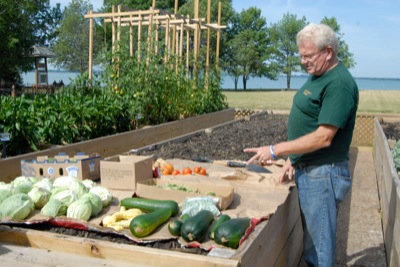
Photo by William Kincaid/The Daily Standard
Kip Wright, an instructor at Wright State University-Lake Campus, shows 25 pounds of produce harvested from the campus' community garden. Since May, more than 179 pounds of fruits and vegetables have been distributed to local food pantries.
CELINA - A local man's push for community organic gardens is taking hold - three have sprouted in Celina.
A garden at Wright State University-Lake Campus has produced more than 179 pounds of fruits and vegetables for local food pantries.
CALL Food Pantry's own newly expanded garden - cleverly christened the Garden of Eatin - is just beginning to bear produce for those in need.
A third garden recently was planted on land at Celina Insurance Group with produce going to employees and food pantries.
"This fits in perfect with our wellness initiative," Bill Montgomery, president of Celina Insurance Group, said about the garden maintained by employees and local experts.
Celina resident David Sundersingh, a staunch supporter of all forms of sustainable living, has been trying to organize a group to produce, sell and promote homegrown, organic food. He has been helping at Celina Insurance Group's garden.
"The whole point is to educate ... what is organic food," Sundersingh said, adding that organic farming precludes or strictly limits what he considers unhealthy synthetic fertilizers, pesticides, herbicides, insecticides, fungicides and plant growth regulators. "That's the bottom line for organic farmers."
Organic farming relies on techniques such as crop rotation, green manure, compost and biological pest control, said Sundersingh, a 63-year-old former senior scientist for the National Building Research Institute of India, who moved to Celina 14 years ago.
Celina Insurance Group has set up 30 raised beds on land across from the company's parking lot. Employees and others are responsible for planting, watering and maintaining individual plots.
The company gardeners have planted tomatoes, eggplants and other crops and have the option of eating the food themselves or donating it to CALL in Celina, Montgomery said.
"It happened so fast," he said about the gardens established in early June.
Also, Ace Hardware of Celina donated several garden beds that local Boy Scouts and Girls Scouts are taking care of at Celina Insurance Group. One troop is building a composter so gardeners can contribute their clippings and eventually use the organic matter for fertilizer.
Sundersingh agrees the garden is a first step, but his ambitions include establishing green houses to produce food during the winter, too.
"Our goal is to start a farmer's market," he said.
The Lake Campus' community garden contains more than 1,000-square-feet of plots in eight beds constructed chiefly by campus instructors Ron Kremer and Kip Wright.
Maintained by a crew of faculty, administrators and students known as the dirty dozen, the surprisingly lush gardens located south of Dwyer Hall contain green beans, radishes, parsley, potatoes, zucchini, green peppers, red beets, carrots, green onions, cabbage, yellow squash, lettuce, cucumbers and strawberries. The produce is donated to CALL and Agape Food Pantry in St. Marys.
Wright and Kremer said the gardens are largely organic, sans some miracle grow that initially was applied to boost production.
The garden beds consist of one truckload of dirt, leaves and grass trimmings from St. Mary Township and Celina, as well as food scraps from the kitchen and shredded paper from campus offices that Kramer said is good for worms.
"Ninety percent of it is leaves and grass clippings," Kremer said.
The two men also are constructing a compost bin.
Strawberries, lettuce and green beans already have been harvested, and in their place the dirty dozen is now growing other crops. Graduate student Seth Baker said gardeners are experimenting with other crops they hope they can grow later into the year.
Staff and faculty have logged more than 400 service hours tending to the garden.
"Working in the community garden is completely invigorating for me," Lake Campus employee Liane Muhlenkamp said. "There's no better way to give back to the community than to actually get out there and do it."
CALL's own gardens have greatly expanded this year due to various donations. Deb Powell and Dues Nursery donated plants, Knous Lawn Care donated soil and labor and St. Henry Tile donated 120 cement blocks where some of the garden beds are located. Also, Bella's Italian Grille donated money for the project, director, Rev. Tim Clutter said.
"It's about as organic as you can get," he said, adding that no fertilizers or pesticides are used.
The Garden of Eatin is maintained by a client family and other volunteers.
"We have tomatoes, Brussels sprouts, cucumbers, zucchini, melons, lettuce, onions and some other things," Clutter said. "It's just starting to come off right now."
In fact, cucumbers and green peppers harvested on Monday morning were all taken by food pantry clients the same day.
"It's always a great thing to have fresh produce to offer to the clients when they come through," Clutter said.
How to join organic movement:
A loose allegiance of like-minded individuals have begun gathering to learn more about self-sustaining, organic farming.
No official meeting time or group name has been set, but people have been meeting at the Celina Insurance Group to learn more about growing healthy foods.
Mike Dues, owner of Dues Nursery, will talk about composting for organic gardens at 7 p.m. Monday in the Group's training center. Guests should enter through the front doors on Walnut Street.
Local sustainability expert David Sundersingh wants to spearhead an organic food movement and is asking fruit and vegetable growers, business leaders, investors and anyone else captivated by the idea of procuring healthier food to come forward.
"The ultimate goal is toward health and wellness," Sundersingh said. "The amount of chemicals that we ingest is not very good for our health; read a label on a can or a product to understand this."
Depending on the response, Sundersingh wants to find suitable areas with plots for individuals to grow fruits and vegetables from Memorial Day to Labor Day.
He envisions the establishment of a store in Celina where the harvested crops could be sold. The area is sorely in need of a business where organic food can be purchased on a daily basis and a restaurant that sells such items.
For more information about the local organic effort, contact Sundersingh at 419-305-9243 or by email at dsundersingh@gmail.com.
- William Kincaid
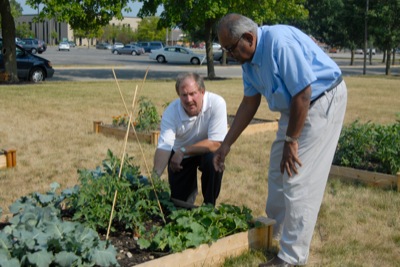
Photo by William Kincaid/The Daily Standard
Celina Insurance Group President Bill Montgomery and local sustainability expert David Sundersingh inspect the organic garden located across from the insurance company. Employees and others are producing chemical-free, organic food for their own consumption and for those in need.
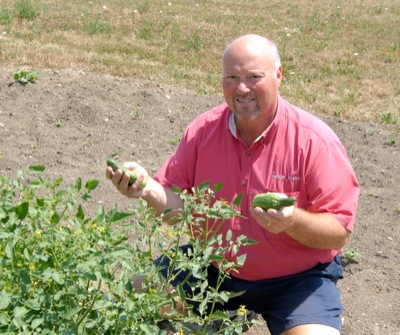
Photo by William Kincaid/The Daily Standard
Rev. Tim Clutter, director of CALL Food Pantry in Celina, picks produce from the Garden of Eatin on Monday.
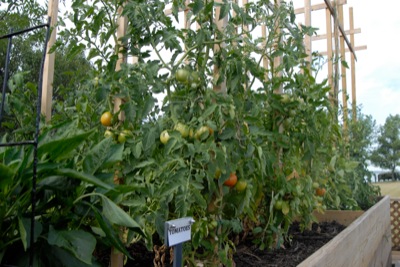
Photo by William Kincaid/The Daily Standard
Tomatoes sprout at the Lake Campus' community gardens.
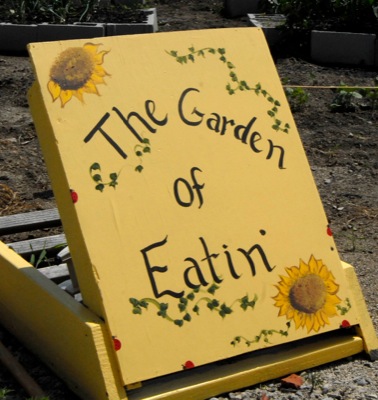
Photo by William Kincaid/The Daily Standard
CALL Food Pantry's Garden of Eatin is in full bloom this summer.
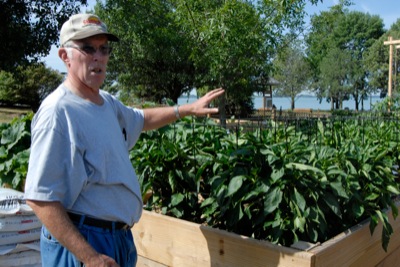
Photo by William Kincaid/The Daily Standard
Ron Kremer, a member of the Lake Campus' dirty dozen that tends the community garden, talks about fruits and vegetables being grown in the beds. Some of this year's crops include green beans, radishes, parsley, potatoes, zucchini, green peppers, red beets, carrots, green onions, cabbage, yellow squash, lettuce, cucumbers and strawberries.
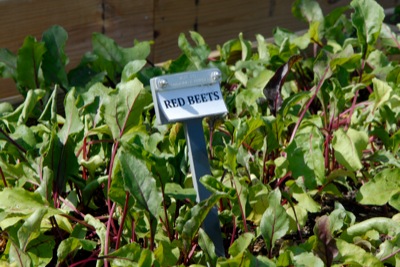
Photo by William Kincaid/The Daily Standard
Some of the growing produce at the Lake Campus' community garden.
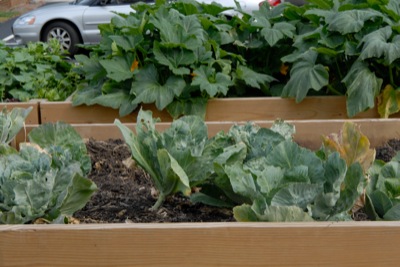
Photo by William Kincaid/The Daily Standard
Some of the growing produce at the Lake Campus' community garden.






